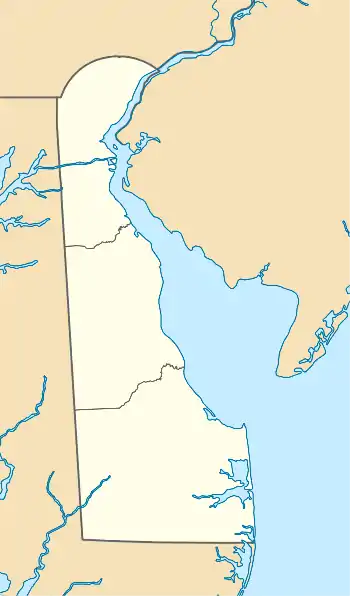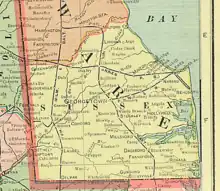Angola, Delaware
Angola is an unincorporated community adjacent to the Angola Neck peninsula in Sussex County, Delaware, United States. Angola is located on an inlet of Rehoboth Bay and is near Delaware Route 24. It is a population center for the Indian River Hundred.
Angola, Delaware
Angola by the Bay | |
|---|---|
 Angola  Angola | |
| Coordinates: 38°40′09″N 075°11′21″W | |
| Country | United States |
| State | Delaware |
| County | Sussex |
| Elevation | 23 ft (7 m) |
| Time zone | UTC-5 (Eastern (EST)) |
| • Summer (DST) | UTC-4 (EDT) |
| Area code | 302 |
| GNIS feature ID | 216441[1] |
Geography
Angola lies along Delaware Route 24, where that road crosses Herring Creek. Angola is 2.5 miles (4.0 km) east of Hollyville and 5 miles (8.0 km) northwest of Long Neck.
History
Angola took its name from the slaves from Angola who were imported to the community ("the First Africans in Virginia"). The nearby peninsular area has been called "Angola Neck" since the 1600s, as Gullahs were used for plantation labor, both before and after slavery was abolished.[2]
19th century
In 1800, Methodists in Angola began meeting at the Angola Schoolhouse. In 1838, a site on Robinsonville Road was selected, and this became Connelly's Methodist Episcopal Church, now known as Conley's United Methodist Church.[3]
In 1836, the Angola post office began operations.[2] Circa the 1850s, a dam was built on Herring Creek, creating Burton's Millpond. There was once a grist mill on this dam.[2]
In February 1876, a new church in Angola was blown off its foundations due to extreme winds.[4]
Circa 1890, Angola's population was just 12 residents.[5]
20th century

Angola's population had grown to 18 residents by 1900.[6] Around this time, the community was the site of the Angola Grange,[7] a social organization intended to promote the economic well-being of the community.
By 1925, Angola's population had grown to 95 residents.[8] In the early 20th century, the Angola Telephone Company operated a telephone exchange in the area, following a Sussex County decision allowing telephone companies to place telephone poles and lines along roadways.[9]
The community had a post office until 1937.[10]
By 1955, Angola was said to consist of "a store and several houses". The store was the Burton store, an old country mercantile.[2]
References
- U.S. Geological Survey Geographic Names Information System: Angola, Delaware
- Delaware: A Guide to the First State. US History Publishers. 1955. pp. 501–502. ISBN 978-1-60354-008-7.
- "History - Conley's United Methodist Church". Conley's UMC. Retrieved August 1, 2021.
- "State News". Wilmington Daily Gazette. February 7, 1876. p. 3. Retrieved August 1, 2021.
- Cram, George Franklin (1887). Cram's Universal Atlas: Geographical, Astronomical and Historical, Containing a Complete Series of Maps of Modern Geography, Illustrated by Numerous Views and Charts; the Whole Supplemented with Valuable Statistics, Diagrams, and a Complete Gazetteer of the United States. G.F. Cram. p. 356.
- Cram's Modern Atlas: The New Unrivaled New Census Edition. J. R. Gray & Company. 1902. p. 84.
- "Sussex County Notes". Wilmington Evening Journal. May 11, 1908. p. 3. Retrieved August 1, 2021.
- Premier Atlas of the World: Containing Maps of All Countries of the World, with the Most Recent Boundary Decisions, and Maps of All the States,territories, and Possessions of the United States with Population Figures from the Latest Official Census Reports, Also Data of Interest Concerning International and Domestic Political Questions. Rand McNally & Company. 1925. p. 175.
- "Sussex Levy Court". Wilmington Evening Journal. May 4, 1911. p. 9. Retrieved August 1, 2021.
- Delaware Federal Writers' Project (1948). Delaware: A Guide to the First State. US History Publishers. p. 549. ISBN 9781603540087.